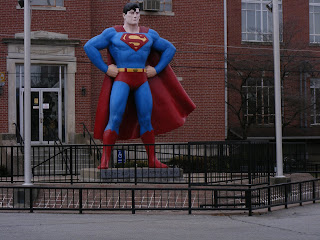

9:05 - We skirted the mall and walked toward the Capitol along Constitution Avenue. Entry to the center of the mall was blocked except for certain entry points, other areas were filled in with restrooms and vendors. At the area just beyond the Smithsonian Castle, the road was blocked off and we were diverted inward, toward the mall. Crowds were dense, and we could barely move. Some couples held hands to keep from being pulled apart by the crowd; my associate grabbed onto my bag so as to accomplish the same thing in a more platonic way. We eventually realized that we couldn't get to the mall at all via this path, and yet people still continued to fight their way as close to the center as possible. People in the crowd were reluctant to let anyone in. Some families pleaded with others in the crowd to let them through, others simply tried to bully their way in. We made our way closer to the center in hopes of getting a clearer view of the Capitol, but after roughly ten more feet we reached the point of total immobility. Seemingly invisible forces pushed people left and right. A woman nearby remarked that at least this would help her trim her waistline. The whole experience was unpleasant, and since we couldn't see the capitol anyway, we decided to move back. We slowly threaded our way out of the central crowd, and eventually we made it to a place where it was possible to walk normally again. As we were leaving, a children's choir began to sing, and a large group of medical officials begged people in the crowd to let them in to help a sick man I found a small American flag on the ground and picked it up.



10:15 - We walked back toward the Washington Monument on Constitution Ave, and entered at the next closest portal to the mall. Amazingly, the central mall wasn't nearly as dense at this point and we were able to move toward the capitol, reaching a point almost as close as where we had been. Everyone was standing, and even though we had a clearer view of the capitol, we were far enough away that it was difficult to see much of anything. But spirits still ran high. People periodically waved their flags in response to the marine band now playing, and a group of small children traced "Obama" in the dirt. A photographer from the Chicago Sun-Times saw this and excitedly snapped dozens of pictures of them.

10:30 - Recognizable senators began to arrive, as shown on the jumbotrons and announced over the loudspeakers. We saw Ted Kennedy, John McCain, and Joe Lieberman, who didn't get a particularly favorable reaction from the crowd. Then, members of the president's cabinet began to file in, followed by all the former vice presidents and former presidents. Carter got a cheer, Bush Sr. didn't get much of a reaction, and the Clintons drew huge roar from the crowd. I asked my associate what he thought the crowd's reaction to George W. Bush would be, a man in front of me overheard and said that he would "get his boo on". Eventually Bush did arrive, and while the gentleman in front of us made good on his promise, other people made an effort to applaud the president despite their opposition to him. Eventually the booing converted to chants of "Na na na na, hey hey hey, goodbye".


11:00 - Diane Feinstein took the podium and announced the beginning of the inaugural ceremony. Rick Warren was called forward to bless the event, and while I was expecting to see signs of discomfort from some people in the crowd, no one seemed upset. Perhaps they were so happy to be done waiting that they forgot Warren's previous history. Aretha sang, Biden was sworn in, and a quartet played John Williams's rendition of the hyper-Americana melody "Simple Gifts". The crowd went wild when Biden was sworn in, and the mood became pensive as music played, at least until Anthony McGill's impassioned clarinet performance began midway through the piece. It was then time for John Roberts to administer the oath to Obama. From the mall, it seemed as if Obama balked a bit at saying his middle name, but as it turned out he was actually just reacting to the way Roberts had read the oath. The crowd didn't seem to notice Roberts's mistakes during the oath, and after he finished the crowd erupted in cheers. Strangers hugged and gave high fives and some even cried. After a moment of celebration, Obama gave his address. It was one that would later be described as harsh, but to the Washington audience it seemed to convey the same gleam of hope that had been prevalent throughout his whole campaign. Obama sat down as the crowd continued to cheer. Eventually, people began to leave, but my associate and I stayed to listen to Elizabeth Alexander's poem, and Joseph Lowery's benediction. While he expressed his hope that "white would do what was right", I was convinced more than ever that we had all done what was right by electing a capable leader.









































